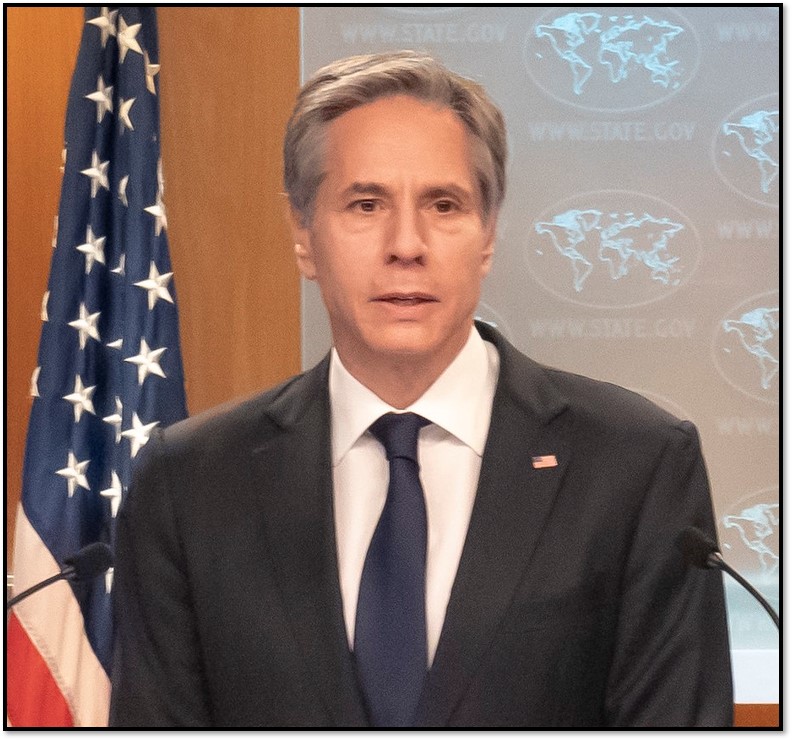On September 3, the Treasury Department sanctioned four Iranian intelligence operatives who plotted to abduct an Iranian-American activist. “Iran’s attempt to kidnap a U.S. citizen on U.S. soil because she used her freedom of speech to criticize the Iranian government is unacceptable and an egregious violation of fundamental international norms,” Secretary of State Antony Blinken said. He added that the plan was part of a broader effort to silence Iranian dissidents in Britain, Canada and the United Arab Emirates.

Masih Alinejad – a Voice of America contractor and fierce critic of Iran’s compulsory dress code–was the intended target in the United States. Alinejad, who was born in Iran, fled the country in 2009 after writing articles critical of then-President Mahmoud Ahmadinejad. She lived in the United Kingdom for five years before obtaining a green card in 2014. She became a U.S. citizen in October 2019. Alinejad runs a Facebook page “My Stealthy Freedom,” where she posts videos of Iranian women filming themselves without the mandatory hijab, or head covering, in public. In August 2020, Iranian hardliners urged the intelligence services to abduct Alinejad and bring her back to Iran.
The Treasury Department sanctioned senior official Alireza Alireza Shahvaroghi Farhani and three men working under him, Mahmoud Khazein, Kiya Sadeghi, and Omid Noori for acting on behalf of the Iranian Ministry of Intelligence and Security, which was sanctioned in 2012 for human rights abuses. In July 2021, the Department of Justice had charged the men with conspiracy to kidnap, violating U.S. sanctions on Iran, money laundering and bank and wire fraud. They faced a lifetime in prison, if convicted on all charges.
Secretary of State Antony Blinken’s Statement

Iran’s attempt to kidnap a U.S. citizen on U.S. soil because she used her freedom of speech to criticize the Iranian government is unacceptable and an egregious violation of fundamental international norms. Beyond this specific plot, the United States remains aware of ongoing Iranian interest in targeting other American citizens, including current and former U.S. officials.
As I said on July 19, we will not tolerate efforts to intimidate independent journalists or silence their voices. We will hold those responsible to account. And we will not tolerate any attacks on U.S. citizens, here or abroad.
Today, in response to this specific plot, the United States is imposing sanctions on senior Iran-based intelligence official Alireza Shahvaroghi Farahani, who led a network of affiliates, including Mahmoud Khazein, Kiya Sadeghi, and Omid Noori, tasked with planning this kidnapping on U.S. soil as well as targeting Iranian dissidents in the United Kingdom, Canada, and the United Arab Emirates. The failed plot to kidnap a U.S.-based journalist and human rights activist resulted in a U.S. Department of Justice indictment of members of the network in July of this year. All four individuals are being sanctioned pursuant to Executive Order 13553, for having acted for or on behalf of, directly or indirectly, the Iranian Ministry of Intelligence and Security, a U.S.-sanctioned entity.
The United States will continue to oppose and hold accountable governments that resort to transnational repression, whether to target dissidents, journalists, or opposition leaders. These actions threaten the rules-based international order and undermine collective peace and security.
Treasury Department Announcement
Today, the U.S. Department of the Treasury’s Office of Foreign Assets Control (OFAC) is designating four Iranian intelligence operatives who targeted a U.S. citizen in the United States and Iranian dissidents in other countries as part of a wide-ranging campaign to silence critics of the Iranian government. Senior intelligence official Alireza Shahvaroghi Farahani led a network that plotted the kidnapping of a U.S. journalist and human rights activist, a failed plot that led to the indictment of members of the network in late July. Consistent with the well-documented role of the Ministry of Intelligence and Security (MOIS) in domestic repression, this operation demonstrates the pernicious role of Iran’s intelligence apparatus in targeting Iranians abroad, to include brazen attempts to return dissidents to Iran.
“The Iranian government’s kidnapping plot is another example of its continued attempt to silence critical voices, wherever they may be,” said Director of the Office of Foreign Assets Control, Andrea M. Gacki. “Targeting dissidents abroad demonstrates that the government’s repression extends far beyond Iran’s borders.”
The United States will continue to hold accountable authoritarian governments that resort to transnational repression, whether to target dissidents, journalists, or opposition leaders. These actions threaten the rules-based international order and undermine collective peace and security.
Today’s action is being taken pursuant to Executive Order (E.O.) 13553. MOIS was previously designated pursuant to E.O. 13553 in 2012 for being responsible for, or complicit in, the commission of serious human rights abuses against Iranian people since June 12, 2009. MOIS has played a key role in the Iranian government’s brutal human rights abuses against Iranians. Iranian repression, often carried out at the hands of MOIS, has also stretched beyond Iran's borders, with a string of similar plots in Europe and elsewhere.
U.S. KIDNAPPING PLOT
Senior Iran-based intelligence official Alireza Shahvaroghi Farahani leads a network of intelligence operatives, including Mahmoud Khazein, Kiya Sadeghi, and Omid Noori, tasked with targeting Iranian dissidents in the United States, the United Kingdom, Canada, and the United Arab Emirates. Farahani, Khazein, Sadeghi, and Noori planned the abduction of a New York City-based Iranian-American activist by utilizing the services of a private investigator to conduct surveillance on the victim and laundered money from Iran to the United States to pay for this surveillance. Sadeghi acted as the network’s primary point of contact with the private investigator in the United States and researched options to abduct the victim via military-style speedboats out of New York City for transport to Venezuela. Noori facilitated payment to the investigator, while Khazein researched travel routes from the victim’s residence to potential exfiltration points. Farahani, Khazein, Sadeghi, and Noori have been indicted in the U.S. District Court for the Southern District of New York for conspiracy related to kidnapping, sanctions violations, bank and wire fraud, and money laundering.
Alireza Shahvaroghi Farahani, Mahmoud Khazein, Kiya Sadeghi, and Omid Noori are being designated today pursuant to E.O. 13553 for having acted or purported to act for or on behalf of, directly or indirectly, the MOIS.
SANCTIONS IMPLICATIONS
All property and interests in property of these designated persons that are in the United States or in the possession or control of U.S. persons must be blocked and reported to OFAC. OFAC’s regulations generally prohibit all dealings by U.S. persons or within (or transiting) the United States that involve any property or interests in property of blocked or designated persons.
In addition, non-U.S. persons that engage in certain transactions with the persons designated today may themselves be exposed to designation. Furthermore, any foreign financial institution that knowingly conducts or facilitates a significant transaction for or on behalf of the persons designated today could be subject to U.S. correspondent or payable-through account sanctions.
